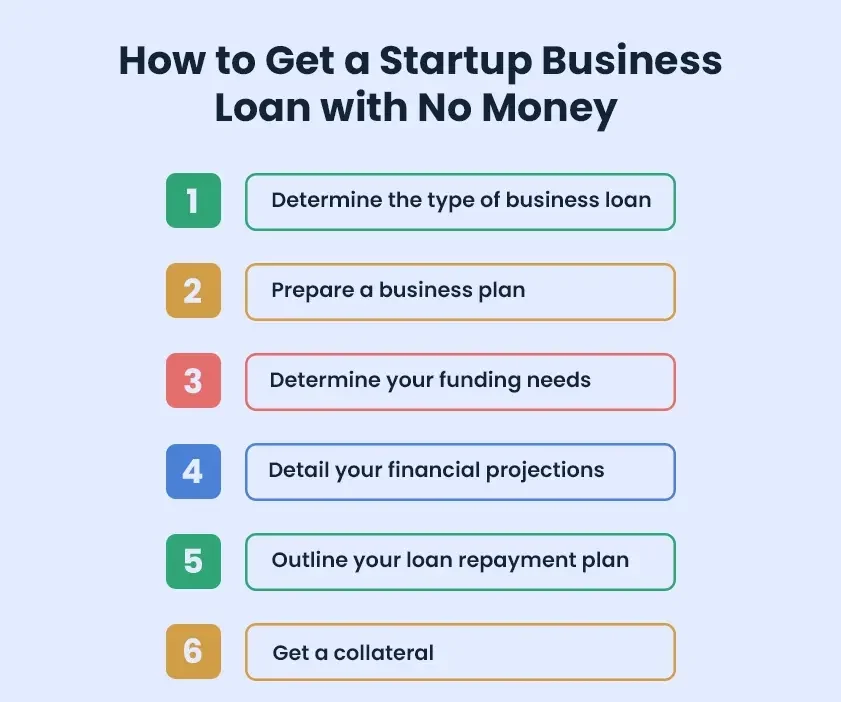Start-up businesses normally encounter difficulty securing sufficient financing, especially when the economic environment is gloomy. Getting a business loan will surely be the best way to secure additional capital. However, there is no assurance that loan applications are instantly and surely approved. Banks are stricter these days because they do not want to lose money from lending to failing ventures.
You need more confidence in yourself and your new business. You must convince the loan provider to approve your loan application because you carry less or no risk.
If you are a startup, there are ways to improve your chances of getting funding. By following the right steps, you can find the right loan and lender and set yourself up for success.

Step 1: Know How Much Funding You Need
One of the most common mistakes new business owners make is asking for more money than they actually need. While it is a good idea to ask for extra funds to cover unexpected expenses, borrowing too much can lead to problems with paying back the loan later.
Before you apply for a loan, make sure you have a clear understanding of how much money you need. You can do this by creating a financial forecast for your business. Think about your expected income and all of your expenses—this will give you a good idea of how much money you will need to get through your first months or even your first year of operation.
By estimating how much revenue you expect to make, you can also figure out when your business will start generating enough income to cover your loan payments. This plan should be a key part of your business plan and will show lenders that you are prepared.
Step 2: Choose the Right Type of Loan
There are many different types of business loans, and each one serves a different purpose. As a new startup, it is important to know which type of loan fits your needs best. Here is an overview of some common loan options:
- Term Loans: These loans are lump sums that you repay over time with interest. They can range from $10,000 to $10 million and are used for general business needs like buying equipment or expanding operations.
- Business Lines of Credit: This flexible funding option allows you to borrow only the amount of money you need when you need it. Similar to a credit card, it gives you access to a set amount of money (up to $500,000) to cover costs like payroll or inventory.
- SBA Loans: These loans are backed by the U.S. Small Business Administration and often have better terms and lower interest rates. They can be used for a variety of business needs, from purchasing equipment to covering operating expenses. SBA loans can go up to $5.5 million.
- Microloans: These are small loans (usually up to $150,000) and are often offered by nonprofit organizations or the SBA. They tend to have more lenient requirements and can be ideal for small startups.
- Equipment Financing: If you need to buy equipment, this type of loan provides a lump sum of money that you repay over time. The equipment you purchase acts as collateral, which can sometimes result in lower interest rates.
- Commercial Real Estate Loans: These loans are used to purchase commercial property, such as office buildings or warehouses. They are typically larger loans (up to $10 million) and secured by the property itself.
Each type of loan has pros and cons, so take time to research the one that best suits your business. Also, make sure to compare loan amounts, interest rates, and repayment terms from different lenders.
Step 3: Check Your Eligibility
Lenders have different criteria to determine whether or not you qualify for a loan. Here are the common factors they look at:
- Personal Credit Score: Most lenders will check your credit score. A score of around 600 to 670 is often required. If your credit score is lower, you might still qualify, but with higher interest rates.
- Time in Business: Many traditional lenders require at least two years of business experience. However, online lenders may accept startups that have been in operation for as little as three to six months.
- Annual Revenue: Some lenders will want to see that your business has earned at least $100,000 to $250,000 in annual revenue. Online lenders may accept lower revenue thresholds, with some as low as $50,000.
- Personal Guarantee: Many startup loans require a personal guarantee, which means you will be personally responsible for paying back the loan if your business can not.
If your business is brand new, you might need help meeting all these requirements. In this case, online lenders are more flexible and offer loans to startups with less experience.
Step 4: Compare Lenders
When choosing a lender, compare offers from both online and traditional lenders. Each lender has different interest rates, repayment terms, and approval requirements. Online lenders are often more lenient regarding time in business, which can be a big advantage for startups.
Start by looking at lenders’ websites and comparing their terms and rates. If you like what you see, check if you can prequalify for a loan. Prequalification allows you to see what loan offers you might get without affecting your credit score.
Step 5: Gather Documents and Apply
Once you have chosen a lender, it is time to apply. Here is a list of common documents you will need:
- Personal and business identification (Social Security number, business license, EIN)
- A detailed business plan that includes your financial projections and a plan for how you will use the loan
- Tax returns and financial statements for both your personal and business finances
- Business bank statements and a schedule of any business debts
Having all your documents ready will help make the process smoother and increase your chances of approval.
Tricks To Improve Your Chance To Get Your Startup Loan Approved
Use your home as security or collateral for the loan.
If you are a homeowner, you will have a greater chance of getting approval for a startup loan. That is because you possess a huge asset that can effectively back the loan. Loan providers are, most of the time, risk-conscious. As much as possible, those will stay away from high risks. Business startups usually are included in lender’s high-risk brackets. Your existing assets can be an assurance that you can repay the loan amount even if the business fails.
Cite all your existing and current assets in your loan application.
The loan amount approved is often related to the valuation of security placed against the loan. Aside from your home, other significant assets that should be enumerated are shares, vehicles, bank savings, and other properties. Just be careful when doing this because you certainly will not want to lose everything you have if the startup venture fails to draw fire.
Present a good income record.
Compile all your recent tax returns. Those will demonstrate your good personal finance and income history. Starting a new venture will surely affect that. For now, it is important to demonstrate your capability to generate earnings. This way, your lender will be less cautious and approve your loan application.
Submit a business plan.
In the document, the account where you intend to use the loan amount. If the loan provider can clearly see how you intend to spend the loan proceeds, your loan application will have a higher chance of getting approval. For instance, if you are seeking a $100,000 loan, itemize the projected expenses. This needs to be simple. Lenders want to make sure your new business has a good structure and plan, especially for allocating budget and repaying financial obligations.
Alternative Funding Options
If you are struggling to get a loan, there are other ways to fund your business:
- Business Grants: These can be paid, but they can be competitive and hard to get.
- Crowdfunding: Platforms like Kickstarter or Indiegogo allow you to raise funds from the public.
- Personal Loans: If you can not get a business loan, consider using a personal loan to fund your startup.
- Borrowing from Friends or Family: While it can be risky for relationships, this can be a viable option for some entrepreneurs.
Conclusion
Who would ever want to lend money to a startup that is clearly destined to fail from the beginning? Your startup loan approval will also depend on the prospect of your new business. That is why before you put up one, make sure you have undergone all necessary preparations. A thorough market study is needed. Lenders’ confidence in your business will increase your chance of getting a startup loan approval.
